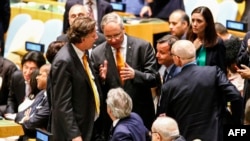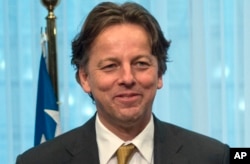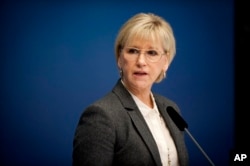The Netherlands and Italy took the rare step Tuesday of agreeing to share a two-year seat on the U.N. Security Council, after a contest that ended in a dead heat.
After five rounds of voting, the countries were tied with 95 votes each. Neither was able to reach the two-thirds majority needed to secure a seat.
After discussions, the two European Union members offered to split the seat allocated to the “Western Europe and Others Group” for one year each.
“I think it’s a signal of the importance we attach to the work of the United Nations in a time when we need more unity, more conflict resolution, more work on development, and at the same time a show of unity in a complex period for Europe,” Dutch Foreign Minister Bert Koenders told reporters.
“We took the opportunity of this perfect parity — 95 to 95 — to decide a proposal that also gives this message of unity between two European countries,” said Italian Foreign Minister Paolo Gentiloni.
The ministers proposed that Italy would serve in 2017 and the Netherlands in 2018. This also would give each country an opportunity to preside over the council, because its presidency rotates monthly on an alphabetical basis.
This was not the first time candidates agreed to split a term. In 1960, after 52 rounds of voting, Poland and Turkey agreed to split a two-year term.
Successful candidates
Also securing seats Tuesday were Bolivia, Ethiopia, Kazakhstan and Sweden.
Bolivia and Ethiopia ran unopposed — their regional groups already had decided among themselves whom to put up as their candidates — but the others competed for their seats.
“The new EU members of the Security Council now have especially sensitive tasks, as the U.K. is going to be distracted at the U.N. by the fallout from Brexit at home,” said Richard Gowan, a U.N. expert at the European Council on Foreign Relations, using the shorthand for the U.K.’s referendum on leaving the European Union. “There is an extra burden for the other Europeans to stand up for EU interests.”
“We have to send a signal about unity — keeping the European Union together, not to speculate too much, not to do all kinds of desperate things, but rather just make sure that we deliver,” Swedish Foreign Minister Margot Wallström told reporters as she marked her country’s election to the Security Council. She said Sweden would focus its council work on conflict prevention, peacekeeping and peacebuilding, as well as security issues and climate change.
Bolivia’s U.N. Ambassador Sacha Llorenti said the issue of Palestine would be a priority for his country, as well as implementing the newly signed deal between Colombia and FARC rebels. Under terms of the deal, the U.N. will be part of a monitoring-and-verification mission in Colombia reporting on the cease-fire and receiving the FARC’s weapons.
Kazakhstan will be the first Central Asian country to sit on the council. “We will try to do our best to bring our perspective and expertise to contribute to the work of Security Council and the United Nations for the cause of peace and development,” Foreign Minister Erlan Idrissov told reporters. He said his government would focus on global security, nuclear disarmament and development.
Ethiopia is a major contributor to U.N. peacekeeping and plays an important regional role as the host of the African Union’s headquarters.
“The really big change to the Security Council won't involve any of the temporary members, but the arrival of a new American team after November's elections,” analyst Gowan speculated. “If it is a [Hillary] Clinton administration, there will be a fair bit of continuity. If there is a [Donald] Trump administration, the U.N. is going to get really, really lively.”
Campaigning
Typically, countries announce their intention to run for council seats years in advance. Sweden, for example, announced its intention more than 10 years ago and campaigned for a year and a half.
Candidates try to woo member states right up until the last minute. Last week, Italy tried to sweeten voters’ moods, passing out free gelato at the U.N., and on Monday night, Kazakhstan threw a lavish party at the famous Plaza hotel to celebrate its candidacy. On Tuesday, “goodie bags” with souvenirs from Sweden, the Netherlands and Thailand blanketed the tables inside the General Assembly hall.
The newly elected council members will replace Angola, Malaysia, New Zealand, Spain and Venezuela, which complete their terms December 31.
The new council members will begin their terms January 1. They will join the five permanent council members — China, France, Russia, Britain and the United States — and five current nonpermanent members — Egypt, Japan, Senegal, Ukraine and Uruguay.






